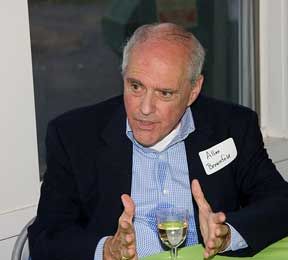
Publisher:
Bonnie King
CONTACT:
Newsroom@Salem-news.com
Advertising:
Adsales@Salem-news.com

~Truth~
~Justice~
~Peace~
TJP
Mar-07-2013 21:26

 TweetFollow @OregonNews
TweetFollow @OregonNews
Philadelphia Magazine Article, 'Being White in Philly' Explores 'Whites, Race, Class and Things Never Said'
Allan C. Brownfeld Salem-News.comPhiladelphia, Huber argues, "remains a largely segregated city, with uneasy boundaries in culture and understanding...
 Courtesy: urban.sbts.edu |
(WASHINGTON DC) - The March 2013 issue of PHILADELPHIA MAGAZINE features a cover article, "Being White In Philly," with the sub-head, "Whites, Race, Class And The Things That Never Get Said."
Written by Robert Huber, the article explains how white and black Philadelphians live in largely separate worlds-----and rarely communicate frankly with one another.
According to Huber, "...white Philadelphians think a great deal about race. Begin to talk with people, and it's clear it's a dominant motif in and around our city. Everyone seems to have a story, often an uncomfortable story, about how white and black people relate."
The author provides a number of examples of such inter-actions. In one case, "Dennis, 26, teaches math in a Kensington school. His year there, fresh out of college, one of his students, an unruly eighth grader, got into a fight with a girl. Dennis told him to stop, he got into Dennis's face, and in the heat of the moment Dennis called the student, an African-American, a 'boy.' The student went home and told his step-father. The step-father demanded a meeting with the principal and Dennis and accused Dennis of being racist. The principal defended his teacher. Dennis apologized, knowing how loaded the term 'boy' was and regretting that he'd used it, though he was thinking, Why would I be teaching at an inner-city school if I'm a racist? The stepfather calmed down, and that would have been the end of it, except for one thing: The student's behavior got worse. Because now he knew that no one at school could do anything, no matter how badly he behaved."
Relations between black and white Philadelphians, in Huber's view are characterized by, "Confusion, misread intentions, bruised feelings----everyone has a race story...There's a dance I do when I go to the Wawa (a convenience store) on Germantown Avenue. I find myself being overly polite. Each time I hold the door a little too long for a person of color...On one level such self-consciousness and hypersensitivity can be seen as progress when it comes to race, a sign of how much attitudes have shifted for the better, a symbol of our desire for things to be better. And yet, lately, I've come to fear that the opposite might be true: that our carefulness is, in fact, at the heart of the problem."
Fifty years after the height of the civil rights movement, more than 25 years after electing its first African American mayor, Philadelphia, Huber argues, "remains a largely segregated city, with uneasy boundaries in culture and understanding...Everyone might have a race story, but few whites risk the third-rail danger of speaking publicly about race, given the long, troubled history of race relations...Race is only talked about in a sanitized form, when it's talked about at all, with actual thoughts and feelings buried...Race remains the elephant in the room, even on the absurd level of who holds the door to enter a convenience store."
Many racial inter-actions reported in this article show ill-will being demonstrated on both sides of the racial divide. White students in predominantly African American schools, for example, report being singled out for a variety of race-based harassments. The level of racial division and segregation in contemporary Philadelphia, which is mirrored in many other American urban areas, is, in many ways, incongruous with a society in which we have elected---and re-elected, a black president. Throughout contemporary America-----in government, business, sports, entertainment, every sector of society, men and women advance on the basis of individual ability, regardless of race. Yet, for many, segregation remains an unfortunate fact of life.
"We need to bridge the conversational divide," concludes Robert Huber, "so that there are no longer two private dialogues in Philadelphia-----white people talking to other whites, and black people to blacks----but a city in which it is okay to speak openly about race. That feels like a lot to ask, a leap of faith for everyone. It also seems like the only place to go, the necessary next step...Meanwhile when I drive to North Philly to visit my son (a Temple University student who lives in a predominantly black neighborhood), I continue to feel both profoundly sad and a blind desire to escape. Though I wonder: Am I allowed to say even that."
PHILADELPHIA MAGAZINE and Robert Huber have given us much to think about---as our country becomes increasingly diverse. Unless Americans of all races and ethnicities begin to speak openly and frankly with one another we will lack the cohesiveness necessary to bind our society together. We have come a great distance from the years of segregation, through which many contemporary Americans lived. This article shows us that there are still problems to be addressed and resolved----on the part of both white and black Americans. We have made significant strides in moving toward a color-blind society----something men and women of good will have long hoped to achieve. That some problems still remain does not make our achievements any less significant and noteworthy, and continue to provide an example to the world--- where the very idea of American nationality is not based upon common race, ethnic background or religion---but on a common commitment to live in a free and open society and bear its responsibilities. In this sense, despite problems which exist, America is genuinely something new and unique in the world.

Salem-News.com contributor Allan C. Brownfeld received his B.A. degree from the College of William and Mary, his J.D. degree from the Marshall-Wythe School of Law of the College of William and Mary and his M.A. in Government and Politics from the University of Maryland. He has served on the faculties of St. Stephen's Episcopal School, Alexandria, Virginia, and the University College of the University of Maryland.
The recipient of a Wall Street Journal Foundation Award, Mr. Brownfeld has written for such newspapers as THE HOUSTON PRESS, THE RICHMOND TIMES DISPATCH, THE WASHINGTON EVENING STAR and THE CINCINNATI ENQUIRER. For many years he wrote three columns a week for such newspapers as THE PHOENIX GAZETTE, THE MANCHESTER UNION LEADER, and THE ORANGE COUNTY REGISTER. His weekly column appeared for more than a decade in ROLL CALL, the newspaper of Capitol Hill. His articles have appeared in such journals as THE YALE REVIEW, THE TEXAS QUARTERLY, THE NORTH AMERICAN REVIEW, ORBIS and MODERN AGE.
Mr. Brownfeld served as a member of the staff of the U.S. Senate Internal Security Subcommittee and was the author of that committee's 250-page study of the New Left. He has also served as Assistant to the Research Director of the House Republican Conference and as a consultant to such members of Congress as Reps. Phil Crane (R-Il) and Jack Kemp (R-NY) and to the Vice President of the United States.
He is a former editor of THE NEW GUARD and PRIVATE PRACTICE, the journal of the Congress of County Medical Societies and has served as a Contributing Editor AMERICA'S FUTURE and HUMAN EVENTS. He served as Washington correspondent for the London-based publications, JANE'S ISLAMIC AFFAIRS ANALYST and JANE'S TERRORISM REPORT. His articles regularly appear in newspapers and magazines in England, South Africa, Sweden, the Netherlands and other countries. You can write to Allan at abrownfeld@gmail.com
 |
 |
 |
Articles for March 6, 2013 | Articles for March 7, 2013 | Articles for March 8, 2013
Salem-News.com:





Terms of Service | Privacy Policy
All comments and messages are approved by people and self promotional links or unacceptable comments are denied.
[Return to Top]
©2025 Salem-News.com. All opinions expressed in this article are those of the author and do not necessarily reflect those of Salem-News.com.